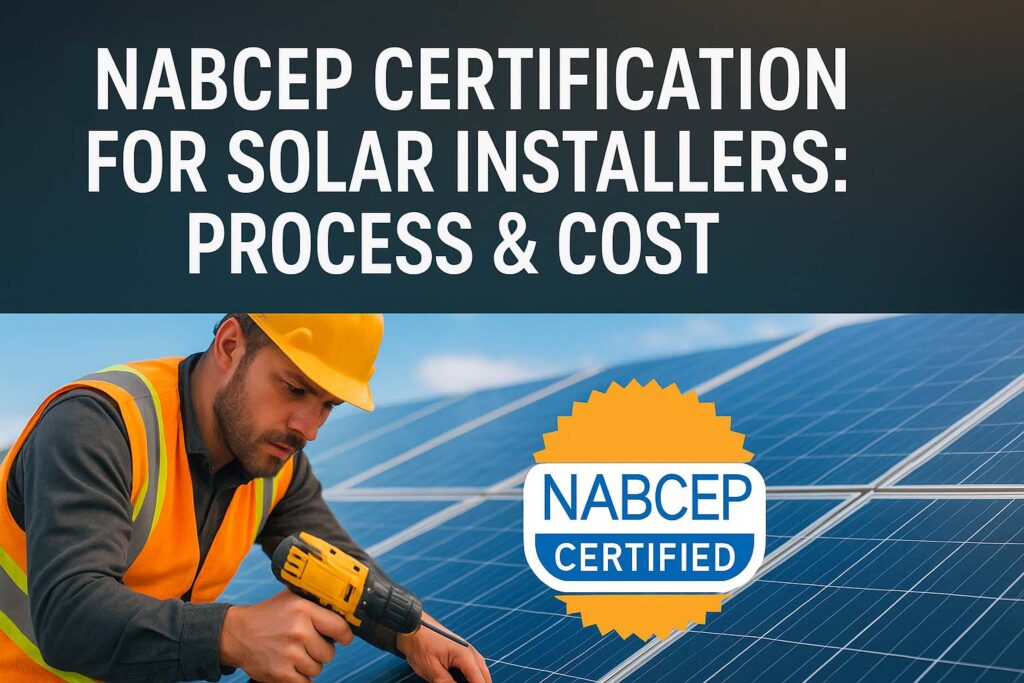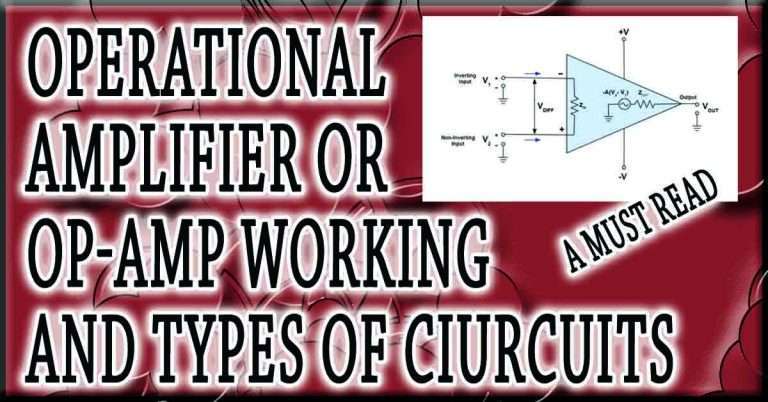NABCEP Certification for Solar Installers: Process & Cost
The solar industry is growing at an incredible pace. Homeowners and businesses want reliable, efficient, and safe solar installations. To meet these demands, professional standards matter more than ever. That’s where NABCEP certification comes in. If you are a solar installer looking to stand out, earning a NABCEP certification is one of the best steps you can take.
Table of Contents
Table of Contents

NABCEP stands for the North American Board of Certified Energy Practitioners. It is the most respected and recognized credentialing body in the renewable energy sector. Their certifications signal competence, quality, and adherence to industry best practices. For customers, seeing NABCEP-certified professionals builds confidence. For installers, it opens doors to better jobs, projects, and pay.
This guide covers everything you need to know about NABCEP certification for solar installers, including the process, costs, and benefits. We will also look at technical details, eligibility criteria, and exam insights.
Key Takeaways:
- NABCEP certification is the top credential for solar professionals in North America.
- It involves meeting eligibility requirements, completing training, and passing a rigorous exam.
- Costs vary from $150 to $500 for exams, plus training fees that can range from $500 to $2,000.
- Certification improves career opportunities, credibility, and earning potential.
Know more about 6-Month Electrical Programs That Pay Well in USA
What Is NABCEP Certification for Solar Installers?
NABCEP certification for solar installers is a professional credential that demonstrates technical expertise and commitment to quality. NABCEP offers several certifications, but the most recognized for installers is the PV Installation Professional (PVIP) certification. This credential focuses on photovoltaic system design, installation, and maintenance.
The certification is not mandatory by law, but many companies prefer or require it. Some state rebate programs also demand NABCEP-certified installers. In short, being certified can give you a competitive advantage in the solar market.
Why NABCEP Certification Matters in Solar Industry
Solar technology requires precision. A poorly designed or installed system can lead to losses, safety hazards, and even fires. Certification ensures that professionals follow the latest codes, standards, and safety guidelines.
NABCEP is trusted across North America. It is ANSI-accredited, which means its certification processes meet strict quality standards. Many utility-scale and commercial projects mandate NABCEP-certified personnel for compliance and insurance purposes.
From a career perspective, NABCEP-certified installers earn higher salaries on average. According to industry surveys, certification can increase annual income by 10-20%. Customers are also more likely to hire certified professionals, which means more job opportunities.
Know more about How to Get Electrical Certification in USA & Transfer It to Europe
Types of NABCEP Certifications for Solar Professionals
Although this guide focuses on installers, NABCEP offers multiple certifications:
- PV Installation Professional (PVIP): Best for experienced installers working on residential and commercial PV systems.
- PV Design Specialist (PVDS): For professionals focused on designing PV systems.
- PV Technical Sales (PVTS): For sales and customer-facing roles.
- Associate Program: Entry-level credential for newcomers to the solar industry.
For installers, the PVIP certification is the gold standard.
Know more about 6-Month Certificate Programs That Pay Well in Canada
Eligibility Requirements for NABCEP Certification for Solar Installers
Before you can apply for the PVIP exam, you must meet certain eligibility requirements. These include training, hands-on experience, and documentation.
Here are the general requirements:
Training: Complete at least 58 hours of advanced PV training. Training must be from a NABCEP-approved provider.
Experience: Document a minimum of six installation projects within the last two years. You should be involved in the design, installation, and commissioning process.
Safety Training: OSHA 10-hour or 30-hour construction safety training is required.
NABCEP carefully reviews your application. You must provide proof of training and project experience. Incomplete applications are often rejected, so attention to detail is critical.
Know more about Free Online Certificate Programs in Electrical on Weekend
NABCEP Certification Process for Solar Installers
Getting NABCEP certified is not an overnight process. It involves several steps:
1. Complete Required Training
Enroll in a NABCEP-approved course. Many training centers and online platforms offer these programs. Look for hands-on workshops in addition to classroom or online learning.
2. Gather Work Experience
Log your installation projects. Make sure they meet NABCEP’s requirements for system size and your role in the project.
3. Submit Application
Apply through NABCEP’s official website. Upload all supporting documents, including training certificates and project logs.
4. Schedule and Take the Exam
Once approved, you will receive an exam authorization. Exams are computer-based and administered at testing centers across the U.S.
5. Maintain Certification
NABCEP certifications require renewal every three years. You must complete continuing education and pay renewal fees.
Know more about Top Trade Schools in USA
NABCEP Exam Structure and Technical Details
The PV Installation Professional exam is challenging. It consists of 70 scored questions and 10 unscored questions. The time limit is 4 hours.
Here is a breakdown of exam content:
| Domain | Percentage |
|---|---|
| PV System Design | 24% |
| Installation | 22% |
| Maintenance & Troubleshooting | 20% |
| Safety | 18% |
| Electrical Code | 16% |
Questions include calculations, diagrams, and real-world scenarios. You should have a strong understanding of:
- National Electrical Code (NEC) for PV systems
- Wire sizing and voltage drop calculations
- Inverter selection and system layout
- Grounding and bonding requirements
- Performance estimation and shading analysis
Many candidates take several months to prepare. Practice exams and codebook familiarity are crucial for success.
Cost of NABCEP Certification for Solar Installers
The cost depends on the certification level and your training provider. Here is a general breakdown:
| Item | Cost Range |
|---|---|
| Application Fee | $150 – $250 |
| PVIP Exam Fee | $375 – $500 |
| Training (58+ hours) | $500 – $2,000 |
| OSHA Safety Training | $50 – $200 |
| Recertification (every 3 years) | $390 |
Total cost for the initial certification typically ranges from $1,000 to $3,000 when training and exam fees are included.
Although it seems high, the return on investment is excellent. NABCEP-certified professionals often secure better-paying projects and long-term career growth.
Benefits of NABCEP Certification for Solar Installers
- Credibility: Demonstrates expertise and professionalism.
- Higher Earnings: Many companies pay a premium for certified professionals.
- Customer Trust: Homeowners prefer certified installers.
- Access to Incentives: Some state programs require NABCEP-certified personnel.
- Career Growth: Easier entry into commercial and utility-scale projects.
How Long Does It Take to Get NABCEP Certification?
On average, the process takes 3 to 6 months, depending on your prior experience. If you already have the required training and projects logged, it could be faster. However, beginners may need up to a year to meet all requirements.
Tips for Passing the NABCEP Exam
- Study the NEC thoroughly, especially Article 690.
- Practice with sample exams and real installation scenarios.
- Use NABCEP’s official resource list and handbooks.
- Review calculations for wire sizing, voltage drop, and system performance.
- Focus on safety codes and grounding principles.
Know more about Electrical Engineering Short Courses That Lead to High-Paying Roles
Final Thoughts on NABCEP Certification for Solar Installers
Earning NABCEP certification for solar installers is one of the smartest career moves you can make. It proves your technical competence and sets you apart in a competitive market. While the process requires time, money, and effort, the benefits outweigh the costs. Certified professionals enjoy better opportunities, higher salaries, and greater job security.
Frequently Asked Questions
Is NABCEP certification worth it?
Yes, NABCEP certification is worth it as it enhances credibility, improves job prospects, and can lead to higher earning potential in the solar industry.
What is the best certification for solar installers?
NABCEP PV Installation Professional (PVIP) is considered the best certification for solar installers due to its industry recognition and comprehensive coverage.
Which NABCEP certification is best?
The NABCEP PV Installation Professional (PVIP) certification is the top-tier option, ideal for experienced solar installers seeking advanced credentials.
How much does it cost to get a NABCEP certification?
The cost ranges from $150 for entry-level exams to about $500 for advanced certifications like PVIP.
Is it worth becoming a solar installer?
Yes, with rising renewable energy demand, solar installation offers strong job growth, good pay, and long-term career stability.
How long is a NABCEP certification good for?
NABCEP certifications are valid for 3 years and require continuing education for renewal.
How do I get NABCEP certification?
You must meet eligibility requirements, complete training, gain field experience, and pass the NABCEP exam.
Is there a demand for solar installers?
Yes, solar installer jobs are projected to grow rapidly, driven by increasing clean energy adoption worldwide.
How many people have NABCEP PVIP?
Over 3,000 professionals currently hold the NABCEP PVIP certification, making it a respected credential.
What are NABCEP credits?
NABCEP credits are continuing education units required to maintain certification and stay updated on industry standards.
What is the NABCEP exam?
The NABCEP exam is a standardized test assessing knowledge and skills in solar system design, installation, and safety practices.
Follow Us on Social:
Subscribe our Newsletter on Electrical Insights for latest updates from Electrical Engineering Hub
#NABCEPCertification, #SolarInstallers, #SolarEnergy, #RenewableEnergy, #SolarTraining, #SolarCertification, #CleanEnergy, #SolarProfessionals, #SolarCareers, #GreenEnergy, #SolarPower, #EnergyEfficiency, #SolarIndustry, #SolarTech, #SustainableEnergy


